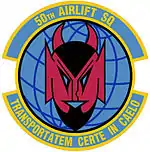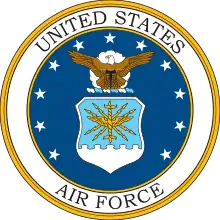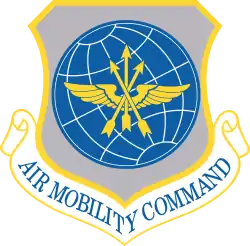50th Air Refueling Squadron
The 50th Air Refueling Squadron is a unit of the US Air Force, assigned to the 6th Operations Group, 6th Air Mobility Wing at MacDill Air Force Base, Florida. It operates the Boeing KC-135R Stratotanker aircraft conducting air refueling missions.
| 50th Air Refueling Squadron | |
|---|---|
.jpg.webp) Boeing KC-135 of the 6th Air Mobility Wing | |
| Active | 1942–1946; 1949-2016; 2017-present |
| Country | |
| Branch | |
| Role | Air Refueling |
| Part of | Air Mobility Command |
| Garrison/HQ | MacDill Air Force Base |
| Nickname(s) | Red Devils[1] |
| Motto(s) | Dans Illis Infernum Latin Giving 'em Hell[2] |
| Colors | Red |
| Engagements | European Theater of Operations Mediterranean Theater of Operations Korean War Vietnam War Operation Just Cause Iraq War [3] |
| Decorations | Distinguished Unit Citation Air Force Outstanding Unit Award with Combat "V" Device Air force Outstanding Unit Award Philippine Presidential Unit Citation Republic of Korea Presidential Unit Citation Republic of Vietnam Gallantry Cross with Palm[3] |
| Commanders | |
| Current commander | Lt. Col. Menola Guthrie[4] |
| Insignia | |
| 50th Air Refueling Squadron (approved 12 December 1994)[3] |  |
It is a former USAF C-130H squadron that was inactivated in April 2016. It was previously one of four operational flying Air Mobility Command squadrons stationed at Little Rock Air Force Base, Arkansas under the 19th Airlift Wing. The Fightin' 5-0 along with sister squadrons, the 41st, 53d and 61st Airlift Squadrons, was assigned to the 19th Operations Group.
History
World War II
Activated in the summer of 1942 under I Troop Carrier Command and equipped with Douglas C-47 Skytrains at Drew Field, FL. Trained in various parts of the eastern United States until the end of 1943. Deployed to French Morocco in May 1943 and assigned to Twelfth Air Force to support combat operations in the North African Campaign. Remained with Twelfth Air Force, moving to Tunisia and Sicily providing transport and resupply operations as well as casualty evacuation of wounded personnel in the Mediterranean Theater of Operations (MTO). Reassigned to IX Troop Carrier Command in England during early 1944 as part of the build-up of Allied forces prior to Operation Overlord, the invasion of France.[3]
Began operations by dropping paratroops into Normandy on D-Day (6 June 1944) and releasing gliders with reinforcements on the following day. The unit received a Distinguished Unit Citation for these missions.
After the Normandy invasion the squadron ferried supplies in the United Kingdom. The squadron also hauled food, clothing, medicine, gasoline, ordnance equipment, and other supplies to the front lines and evacuated patients to rear zone hospitals. It dropped paratroops near Nijmegen and towed gliders carrying reinforcements during the Operation Market Garden, the airborne attack on the Netherlands. In December, it participated in the Battle of the Bulge by releasing gliders with supplies for the 101st Airborne Division near Bastogne.
Moved to Belgium in early 1945, and participated in the Western Allied invasion of Germany, participating in the air assault across the Rhine River in March 1945, each aircraft towed two gliders with troops of the 17th Airborne Division and released them near Wesel.
After V-E Day, became part of the United States Air Forces in Europe, and was part of the USAFE European Air Transport System (EATS), supporting the occupation forces in Germany as well as carrying supplies and personnel between various stations in Western Europe. Inactivated in early 1946 while stationed in France, unit inactivated later that year as an administrative unit.
Tactical Air Command
Reactivated as part of Tactical Air Command (TAC) in 1949 with Fairchild C-82 Packets and various gliders as an assault squadron. Deployed to Japan for combat operations in 1950 for the Korean War. Furnished airlift between Japan and Korea and airdropped paratroops and supplies at Sukchon/Sunchon and Munsan-ni. Moved to the Philippines in 1954 after the armistice and was inactivated.[3]
Reactivated in 1957 by TAC as one of the first Lockheed C-130 Hercules squadrons when the aircraft came into operational service. The squadron has been involved in major engagements around the world to include the Korean War, Vietnam War, Persian Gulf War, and the current Operation Iraqi Freedom and Operation Enduring Freedom.
The 50th is also known for humanitarian relief. During the 2004 Asian tsunami crisis, the 50th sent several crews and tons of food rations to Thailand to help those in need. Following the horrors of Hurricane Katrina, 50th aircrews helped relocate survivors from the New Orleans, Louisiana and Biloxi, Mississippi areas to Little Rock, Arkansas. Humanitarian missions were flown in and out of Haiti following a major earthquake in December 2010.
In 2012, elements of the 50th celebrated 70 years of history with members deployed to the 774th Expeditionary Airlift Squadron in Afghanistan.[5]
The squadron was inactivated on 1 April 2016 as part of the 19th Airlift Wings transition to the Lockheed C-130J Super Hercules.
Air refueling mission
A ceremony marking the reactivation of the squadron was held at MacDill Air Force Base, Florida on 2 October 2017. The squadron was redesignated the 50th Air Refueling Squadron, and will fly the Boeing KC-135R Stratotanker as part of the 6th Air Mobility Wing.[1]
Campaigns and Decorations
- Campaigns. World War II: Sicily; Naples-Foggia; Rome-Arno; Normandy; Northern France; Rhineland; Central Europe. Korea: UN Defensive; UN Offensive; CCF Intervention; First UN Counteroffensive; CCF Spring Offensive; UN Summer-Fall Offensive; Second Korean Winter; Korea Summer-Fall, 1952; Third Korean Winter; Korea, Summer 1953. Southwest Asia: Defense of Saudi Arabia; Liberation and Defense of Kuwait.
- Decorations. Distinguished Unit Citations: Sicily, 11 July 1943; France, [6-7] Jun 1944; South Korea, 28 November-10 Dec 1950. Air Force Outstanding Unit Awards with Combat V Device: 1 November 1967 – 31 December 1969; 12 February-17 May 1975. Air Force Outstanding Unit Awards: 6 May 1953 – 10 September 1954; 11 January-14 Feb 1955; 1 January 1960 – 31 December 1961; 1 September 1962 – 15 April 1963; 1 January 1975 – 30 June 1976; 1 June 1985 – 31 May 1986; 1 July 1991 – 30 June 1993; 1 July 1993 – 30 June 1995; 1 July 1995 – 31 March 1997; 1 April 1997 – 30 June 1998; 1 July 2000 – 30 June 2001; 1 July 2001 – 30 June 2002. Republic of Korea Presidential Unit Citation: 1 July 1951 – 27 July 1953. Republic of Vietnam Gallantry Cross with Palm: 1 April 1966 – 28 January 1973. Philippine Republic Presidential Unit Citation: 21 July-15 Aug 1972.
Lineage
- Constituted as the 50th Transport Squadron on 30 May 1942
- Activated on 15 June 1942
- Redesignated: 50th Troop Carrier Squadron on 4 July 1942
- Inactivated on 27 May 1946
- Redesignated: 50th Troop Carrier Squadron, Medium on 20 September 1949
- Activated on 17 October 1949
- Redesignated: 50th Troop Carrier Squadron on 1 January 1967
- Redesignated: 50th Tactical Airlift Squadron on 1 August 1967
- Redesignated: 50th Airlift Squadron on 1 December 1991[6]
- Inactivated on 1 April 2016
- Redesignated 50th Air Refueling Squadron[1]
- Activated c. 2 October 2017[1]
Assignments
- 314th Transport Group (later 314 Troop Carrier Group), 15 June 1942 – 27 May 1946
- 314 Troop Carrier Group, 17 October 1949
- 314th Troop Carrier Wing, 8 October 1957 (attached to 315th Air Division 11 September–c. 16 December 1958, 322d Air Division 27 March-c. 15 August 1961, Unknown. May-Jul 1965[note 1]
- 315th Air Division, 26 December 1965
- 314th Troop Carrier Wing (later 314 Tactical Airlift Wing), 23 February 1966
- 374th Tactical Airlift Wing, 31 May 1971
- 314th Tactical Airlift Wing, 15 August 1973 (attached to 322d Tactical Airlift Wing 1 June–18 August 1974, 374th Tactical Airlift Wing 28 April–6 June 1975, 435th Tactical Airlift Wing 6 December 1975 – 12 February 1976, 513th Tactical Airlift Wing 7 September–1 November 1976, 435th Tactical Airlift Wing, 6 April–9 Jun 1977, 513th Tactical Airlift Wing, 14 January–14 March 1978)
- 314th Tactical Airlift Group, 1 November 1978 (attached to 513th Tactical Airlift Wing, 6 August–8 October 1979)
- 314th Tactical Airlift Wing, 15 June 1980 (attached to 313th Tactical Airlift Group, 5 December 1980 – 12 February 1981, 5 June–14 August 1982, 4 October–14 December 1983, 2 June–14 August 1985, 3 August–16 October 1986, 5 October–16 December 1987, 3 December 1988 – 15 February 1989, 4 August–15 October 1991)
- 314th Operations Group, 1 December 1991 (attached to 313th Tactical Airlift Group 27 November 1992 – 31 January 1993, 86th Airlift Wing, 7 December 1995 – 11 March 1996)
- 463d Airlift Group, 1 April 1997 – October 2008 (attached to 86th Airlift Wing, 5 December 1997 – 30 January 1998, 26 May – 26 July 1999)[6]
- 19th Operations Group, October 2008 - 1 April 2016
- 6th Operations Group, c. 2 October 2017 – present[1]
Stations
|
|
Aircraft
|
|
References
Notes
- Explanatory notes
- Probably attached to 315th Air Division, which controlled airlift assets for Pacific Air Forces.
- Citations
- Perdue, A1C Ashley (2 October 2017). "Bringing 50 Back". 6th Air Mobility Wing Public Affairs. Retrieved 26 January 2018.
- Endicott, pp. 577-579
- Haulman, Daniel L (15 December 2017). "Factsheet 50 Airlift Squadron (AMC)". Air Force Historical Research Agency. Retrieved 26 January 2018.
- "50th ARS "Red Devils" welcome new commander". Retrieved 29 March 2020.
- McCowan, TSG Shawn (21 June 2012). "Historic flying units celebrate anniversary, continue making history". 455th Air Expeditionary Wing Public Affairs. Archived from the original on 1 August 2013. Retrieved 27 January 2018.
- Lineage, including assignments and stations, through 2003 in Haulman.
- Station number in Anderson.
- Station number in Johnson.
Bibliography
![]() This article incorporates public domain material from the Air Force Historical Research Agency website http://www.afhra.af.mil/.
This article incorporates public domain material from the Air Force Historical Research Agency website http://www.afhra.af.mil/.
- Anderson, Capt. Barry (1985). Army Air Forces Stations: A Guide to the Stations Where U.S. Army Air Forces Personnel Served in the United Kingdom During World War II (PDF). Maxwell AFB, AL yes: Research Division, USAF Historical Research Center. Archived from the original (PDF) on 23 January 2016. Retrieved 28 June 2017.
- Endicott, Judy G. (1998). Active Air Force Wings as of 1 October 1995 and USAF Active Flying, Space, and Missile Squadrons as of 1 October 1995 (PDF). Air Force History and Museums Program. Washington, DC: Office of Air Force History. ASIN B000113MB2. Retrieved 2 July 2014.
- Johnson, 1st Lt. David C. (1988). U.S. Army Air Forces Continental Airfields (ETO) D-Day to V-E Day (PDF). Maxwell AFB, AL: Research Division, USAF Historical Research Center. Archived from the original (PDF) on 29 September 2015. Retrieved 26 June 2017.
- Maurer, Maurer, ed. (1983) [1961]. Air Force Combat Units of World War II (PDF) (reprint ed.). Washington, DC: Office of Air Force History. ISBN 0-912799-02-1. LCCN 61060979. Retrieved 17 December 2016.
- Maurer, Maurer, ed. (1982) [1969]. Combat Squadrons of the Air Force, World War II (PDF) (reprint ed.). Washington, DC: Office of Air Force History. ISBN 0-405-12194-6. LCCN 70605402. OCLC 72556. Retrieved 17 December 2016.
- Ravenstein, Charles A. (1984). Air Force Combat Wings, Lineage & Honors Histories 1947-1977. Washington, DC: Office of Air Force History. ISBN 0-912799-12-9. Retrieved 17 December 2016.


.svg.png.webp)